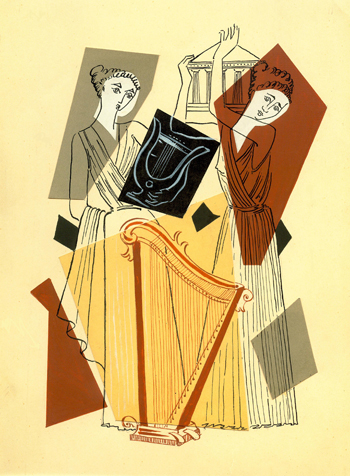ORIENTATIONS
Greek Music of the Twentieth Century
Sunday, May 8, 2005,
2:30 p.m.
McAlpin Rehearsal Hall, Woolworth Center
Admission Free
Featuring works by
Nikos Skalkotas - Yannis A. Papaioannou - Yiorgos Adamis - Michalis Adamis Stratis Minakakis '02
Performed by
Kurt Nikkanen, violin - Stratis Minakakis, piano - Yiorgos Adamis, lyre and voice
Lisa Lynch, voice - Elli Papakonstantinou, voice
The Second Instrumental Unit: Eliot Gattegno, saxophone - David Fulmer, violin - Brendan Kane, bass
Miranda Sielaff, viola - Aaron Jackson, piano
This concert features works that traverse diverse orientations in twentieth century Greek music. Nikos Skalkottas’s “Solo Violin Sonata” (1925) is characteristic of the neoclassical aesthetic in inter-war Europe, and foreshadows some of the major developments that influenced the Greek avant-garde. Yannis A. Papaioannou’s “Okto Anaglyfa” (“Eight Bas-Reliefs,” 1986), exemplifies the influence of the European avant-garde of the 1970s in the context of a personal musical language. Michalis Adamis’s “Kratima” (1971) combines elements from the Greek musical tradition of the Byzantine Church with virtuosic electronic music, thus creating a unique musical idiom. Yorgos Adamis’s “Apoechos” (2005), inspired by a Korean performing tradition, features elements from the musical traditions of the East with an ensemble of European and Greek instruments, as well as free improvisation. Stratis Minakakis's “Ta Ploia” (“The Ships,” 2005) was commissioned by the Program in Hellenic Studies on the occasion of this 25th anniversary concert. It is based on the homonymous prose poem by C.P. Cavafy, and combines post-serial influences with elements from the Greek tradition, such as heterophony and micro-intervals.
Cosponsored by the Department of Music
|

George Vakalo (1902-1991). Untitled. Gift of Eleni Vakalo to the Program in Hellenic Studies. |
